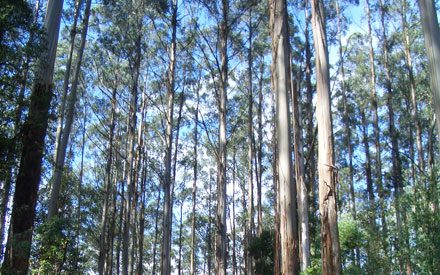
State-owned logging company VicForests relied on a $4.8 million payment from the Andrews government to turn a profit this year, for work it is doing to create homes for the critically endangered Leadbeater’s possum. Source: The Age
The payment, revealed in VicForests’ annual report, casts further doubt on the economic viability of Victoria’s native timber industry, and coincides with polling that shows most voters in Northcote want the government to do more to preserve the state’s native forests.
As the Andrews government fights to hold off the Greens in a by-election due in the inner-city seat next month, environment groups have sought to pressure it to stop propping up the state’s native timber industry, by polling voters on the issue.
Voters were asked if they backed a politically contentious proposal to turn the native forests of Victoria’s central highlands into a vast national park, a move that would impose huge restrictions on the state’s embattled logging industry.
The industry has already been denied access to significant areas of native old-growth forest previously marked for logging in an attempt to save the Leadbeater’s possum from extinction.
This has led to VicForests returning a reduced profit of $1.5 million in 2016-17, as its sale of sawlogs fell to its lowest level in the past five years, the company’s annual report shows.
“Due to an increase in conservation efforts, areas previously available to us have been excluded from timber harvesting over the past year,” chief executive Nathan Trushell said in response to the report.
The report shows VicForests avoided operating at a before-tax loss thanks to a $5.9 million payment from taxpayers, $4.8 million of which was for its involvement in the Leadbeater’s possum recovery program.
The program includes the mechanical creation of 72 artificial tree hollows, in an experiment to see if the possums will nest in them.
The annual report said possums had been observed nesting in 39 of the artificial hollows, in a highly encouraging sign.
But Sarah Rees, director of conservation group My Environment, said VicForests was now in the absurd position of being paid to conserve a species it was also pushing to extinction.
“The fact that taxpayers are subsidising an experiment to offset the killing of the Leadbeater’s possum is beyond the pale,” Ms Rees said.
“It’s a very dangerous situation to prop up a few jobs, and they’re not even making a profit.”
My Environment is one of several groups behind the push for a Great Forest National Park.
The Greens support the park’s creation, while the Andrews government has backed away from the idea under political pressure not to abandon timber workers in regional areas.
Victoria’s native timber industry creates full-time employment for more than 2100 people, according to a 2014 report by Deloitte Access Economics.
However, a ReachTEL survey of 835 residents across the Northcote electorate showed that more than 81% supported or strongly supported the creation of the Great Forest National Park to protect native forests and wildlife from logging.
The proposed national park would stretch across Kinglake to Mount Baw Baw and Eildon, covering 355,000 hectares.
Almost 57% of respondents said they would be more likely to vote for a candidate if they supported the creation of new national parks in the Yarra Valley and Central Highlands to protect the environment.
The survey, conducted last week, was commissioned by the Australian Conservation Foundation, Friends of the Earth, Victorian National Parks Association, My Environment, The Wilderness Society and Friends of the Leadbeater’s Possum.
Labor’s Northcote candidate Clare Burns described herself as an environmentalist.
“I support national parks. I think any plan to create a national park needs to include a just transitions program for any workers affected,” she said.
The survey showed 62.9% of voters in Northcote believed publicly owned state forests should be a place for wildlife, trees and nature to be protected.
Just 7.6% indicated they should be for logging wood and paper products.
However, 59.1% of respondents said the government was not doing enough to protect native wildlife from logging operations.
When asked about their first preference votes, 37.7% of respondents said they would vote Labor and 35% said they would vote Greens.
This year the Andrews government took the unconventional step of buying the Heyfield timber mill in East Gippsland for a speculated price of about $50 million, after its private owners said they would shut the mill down.







